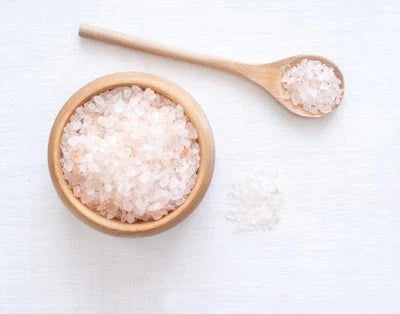IODINE - WHAT IT IS, EFFECTS & CONSUMPTION
WHAT IS IODINE?
Iodine is one of the essential trace elements, as it is particularly important for the thyroid hormones thyroxine and triiodothyronine. These hormones are involved in many processes of the body, such as bone formation, growth, brain development and energy metabolism. For this reason, a good iodine supply should not be underestimated.

WHAT FOODS CONTAIN IODINE?
Iodine can definitely be obtained through diet. Foods rich in iodine include fish, such as pollock, cod, and plaice, but can also be found in seafood, algae. Animal products such as milk, dairy and eggs can also contain high levels of iodine. However, this depends on whether the animals' feed was rich in iodine or not. In addition, iodised table salt can also be used to avoid an iodine deficiency.
But our Ah-Mazing Hair Biotin Vitamins and Trust Your Gut Vitamins also contain iodine. And for kids, we have developed something very special: Our new Doin' It For The Kids with Multivitamin Complex. These vitamin gummy bears also contain iodine, so you don't have to worry about your child getting enough. We recommend them for children ages 4 and up.
WHAT ARE THE BENEFITS OF TAKING IODINE?
As mentioned, iodine is involved in many biological processes in the body. It is an essential building block for the thyroid hormones and important for many tasks in our body. Thus, in the case of an iodine deficiency, an underactive thyroid gland and a goitre can develop (this is the so-called iodine deficiency goitre). However, a sufficient supply of iodine is indispensable not only for adults but also for children. This is because iodine contributes to the normal growth of children.

NASSIM JAMALZADEH:
"A sufficient iodine intake must not be underestimated under any circumstances. Iodine is one of the trace elements essential for human health. That's why it's important to stick to good sources of iodine."
FAQs about iodine
FAQs about iodine
How often you should take iodine depends on you. If you get plenty of iodine from your diet and can thus cover your daily needs, it is not necessary to take it additionally. It is best to ask your doctor and have regular blood tests.
This depends mainly on gender, age, and various other factors, such as whether you are pregnant, breastfeeding or have any illnesses.
The National Health Service (NHS) recommends a daily amount of 180-200 µg/day for adults. However, it should be mentioned that the information provided by the NHS is a recommendation and not a maximum amount.
Having an iodine deficiency is more likely for many people in today's society than suffering from an overdose. Approximately 30% of the world's population is at risk of iodine deficiency. The effects of iodine deficiency can be goitre, as mentioned above, but mental retardation and cerebral damage can also be possible consequences of iodine deficiency. With a balanced and nutritious diet, however, having a sufficient supply of iodine should not be a problem.
However, with additional supplements, it can lead to an overdose. This is mainly characterised by nausea, disturbances in the digestive tract or even a rash.
Let customers speak for us
STUDY ON THE EFFECTIVENESS OF IODINE
We provide the following scientific studies for your general information. The results obtained in these studies do not necessarily apply to all people. Feel free to click on the corresponding links for more detailed information.
Iodine deficiency in children
This report is about the effects of iodine deficiency in children and how supplementation can help.
Our bears with iodine
Our bears with iodine


















